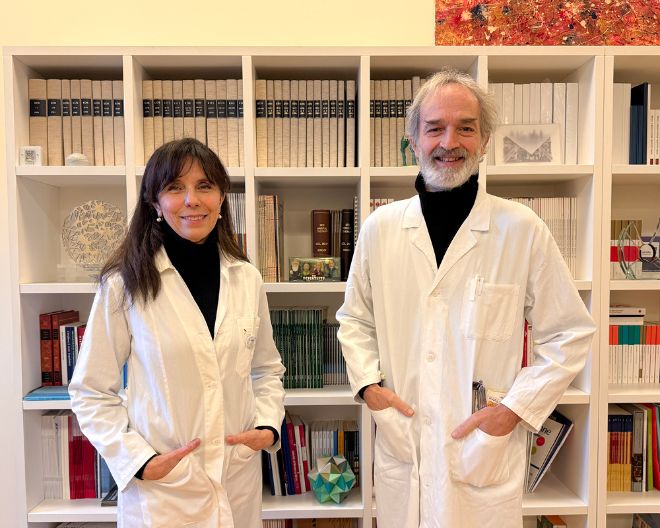An immunotherapy molecule that counteracts chronic hepatitis B tested in preclinical models
0/resolutions/res-l992x10000/Testata_molecola_epatite_B_cronica_UniSR-(1)0.png)
The research, a collaboration with Asher Biotherapeutics, paves the way for treatment of a disease that affects 300 million people worldwide and predisposes to liver cancer.
More than 300 million people worldwide are affected by the chronic form of hepatitis B, among the leading risk factors for liver cirrhosis and liver cancer. In patients with this chronic infection, the immune system fails to eradicate the virus responsible for the disease, which continues to survive and replicate within liver cells. A group of researchers from Vita-Salute San Raffaele University and IRCCS San Raffaele Hospital, thanks to close collaboration with the American start-up Asher Biotherapeutics, has tested for the first time in the world, in preclinical models, a molecule capable of reactivating the immune system against chronic hepatitis B.
The results, published today in the prestigious scientific journal Science Translational Medicine, lay the groundwork for the clinical development of an immunotherapy for this serious pathology. The study was coordinated by Professor Matteo Iannacone, Associate Professor of General Pathology UniSR and Director of the Division of Immunology, Transplantation and Infectious Diseases at IRCCS San Raffaele Hospital, who returned to Italy, after a long research experience in the United States, thanks to the Career Development Award of the Armenise-Harvard Foundation.
/resolutions/res-l1920x10000/Testata_molecola_epatite_B_cronica_UniSR-(1).jpg)
Hepatitis B virus and current treatments
The hepatitis B virus (HBV) is transmitted by contact with infected blood, sexually or from mother to child during childbirth. Unlike what happens when an adult contracts the virus, over 90% of children infected at birth develop the chronic form of hepatitis B. In patients with this chronic infection, the immune system fails to eradicate the virus responsible for the disease, which continues to survive and replicate within liver cells.
There is currently a preventive vaccine for the disease, but patients who are already affected cannot benefit from it. Scientific research is progressing considerably in the field of antivirals, for which San Raffaele is an international benchmark.
The research of Matteo Iannacone's group, in close collaboration with the unit directed by Professor Luca Guidotti, Full Professor of General Pathology and deputy scientific director of the Institute, has in fact contributed in recent years to the development of some of the antivirals commonly used today to treat the disease in its chronic form.
/resolutions/res-l1920x10000/Testata_molecola_epatite_B_cronica_UniSR-(2).jpg)
How to awaken the immune system: the San Raffaele proposal
What causes the ineffectiveness of the immune system and how can its action be reawakened? The researchers had already answered this question with some data published in Nature in 2019. The researchers had demonstrated, through a molecular analysis carried out thanks to intravital microscopy techniques, that T lymphocytes, cells of the immune system responsible for attacking the HBV virus, fail to eradicate the infection and are dysfunctional since their activation.
The work of characterizing dysfunctional T lymphocytes had also allowed the San Raffaele researchers to identify molecules more suitable and effective for reawakening these cells. Among these is interleukin-2, a messenger molecule of the immune system, which acts as a sort of immunotherapy, already successfully tested both in cultured cells obtained from patient samples and in animal models.
Interleukin-2, unfortunately, when administered systemically, produces serious side effects: it increases the permeability of blood vessels, causing severe edema. This happens because the molecule is not only able to reach its target, the T lymphocytes, but also acts on Natural Killer cells, which induce toxicity, and also on regulatory cells which inhibit the immune response.
/resolutions/res-l1920x10000/Testata_molecola_epatite_B_cronica_UniSR-(3).jpg)
The new study
The results just published in the journal Science Translational Medicine add a piece to those published in 2019. Thanks to the collaboration with the company Asher Biotherapeutics which produces interleukin-2, the researchers managed to test this molecule, developing an approach called "cis-targeting": interleukin-2, conjugated with a specific antibody, is able to target only T lymphocytes, activating them correctly against the disease.
“We have seen - on mouse models of the disease - that, by administering this type of immunotherapy, the T lymphocytes expand in number and increase their function, i.e. they release cytokines capable of inhibiting viral replication and eliminate the infected cells, effectively knocking down the virus"
comments Professor Matteo Iannacone.
The results have therefore demonstrated, in preclinical models of hepatitis B and in the blood of healthy people, the safety, low toxicity and therapeutic efficacy of this innovative approach.
“In addition to antiviral approaches, it is possible to finally think about an immunotherapy strategy. The next step is to test this approach on humans, in combination with antivirals"
concludes the researcher.
The research was supported by the European Research Council (ERC), AIRC Foundation for Cancer Research, the Ministry of Health, and the Ministry of University and Research.
You might be interested in

Multiple sclerosis, breakthrough in research: researchers have identified a molecule that promotes repair of the nervous system

The microbiome as an ally against myeloma

Intrecci: a UniSR project for more inclusive and accessible cancer diagnosis

